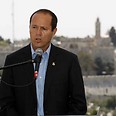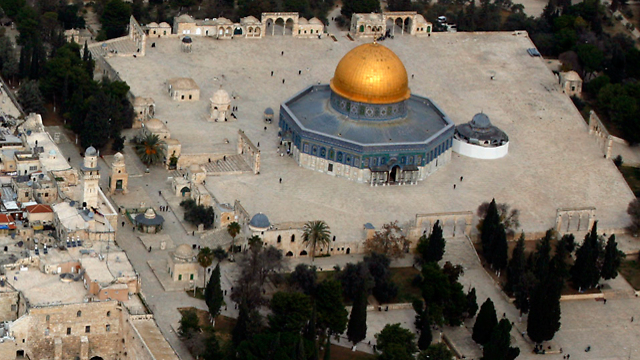
Mayor says Jerusalem can't be split
In AP interview, Barkat says capital can only function as 'united city which treats all residents and visitors honestly and equally'
Jerusalem's mayor said Tuesday that any partition of the city as part of a future peace agreement will not work, insisting only a united city could function and thrive.
In a wide-ranging interview with The Associated Press, Nir Barkat said his administration has treated the city's Arab residents honestly and equally.
Related stories:
- Op-ed: Oh no! They’re building in Jerusalem! Jerusalem pushes forth with settlement plans
- Terrorist plot against Jerusalem mall foiled
Israeli and Palestinian negotiators recently resumed peace negotiations after a five-year lull. The Palestinians demand the eastern sector of the city as their future capital and consider any Israeli construction there illegal settlements that hinder the prospect of peace.
Barkat said thoughts of dividing the city should be off the table.
"It will never function, it will never work. It is a bad deal," the former high-tech entrepreneur told The Associated Press. "Doing a bad deal is worse than no deal."
Israel captured east Jerusalem, home to key Jewish, Muslim and Christian holy sites, from Jordan in the 1967 Mideast war and annexed the area in a move that has not been recognized internationally. The combined population of east and west -- 800,000 -- makes Jerusalem Israel's largest city.
That is split almost evenly into thirds between secular and modern Orthodox residents, Muslim Palestinians, and ultra-Orthodox Jews.
Over the years, the growing religious influence, coupled with a high cost of living, has pushed tens of thousands of secular Jerusalemites to leave the city.
Barkat was elected in 2008 promising to reverse the trend and has attempted to revive secular life in the city without alienating the ultra-Orthodox. Barkat has increased the city's culture budgets and has given the city a boost with high-profile events like concerts, street festivals, marathons and other sporting events.
At the same time, he has outspoken in his belief that Israel must retain control over east Jerusalem.
The fate of the city remains at the heart of the Israeli-Palestinian conflict.
The Israeli government is responsible for peace talks with the Palestinians, and the mayor of Jerusalem has no say in the city's political future. But as chief executive he can affect the delicate balance between Arab and Jew, especially in regards to building permits, construction, education and public services.
Drawing on the city's ancient history, Barkat said Jerusalem has always been at its finest when it was undivided and allowed all those who entered its gates to feel equality and a sense of belonging.
"Jerusalem of 3,000 years ago was not divided into tribes. All people that came to worship ... at the Temple felt that Jerusalem belonged to them as much as it belongs to everyone else and that feeling created a very special atmosphere of belonging," he said. "There is only one way this city can function -- it is a united city that all residents and visitors are treated honestly and equally. It is the only model."
Barkat is seeking re-election to a second five-year term in October.
- Receive Ynetnews updates directly to your desktop











